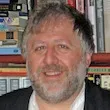Larry Wolff: "Child Sexual Abuse in Casanova's Venice"

The Department of History presents the 2012 Paul H. Beik Lecture to be given by Larry Wolff, professor of history and director of the Center for European & Mediterranean Studies at New York University. This lecture series honors the memory of Paul H. Beik, an historian of France and Russia, who taught and mentored Swarthmore students in history from 1945 to 1980. The series is endowed through the great generosity of his former students and colleagues.
Wolff, an intellectual and cultural historian, works on the history of Eastern Europe, the Habsburg Monarchy, the Enlightenment, and on the history of childhood. He has been most interested in problems concerning East and West within Europe, whether concerning the Vatican and Poland, Venice and the Slavs, or Vienna and Galicia. He developed the argument that Eastern Europe was "invented" in the 18th century by the philosophes and travelers of the Enlightenment, who attributed meaning to a supposed division of Europe into complementary regions, Western Europe, and Eastern Europe. He has analyzed Western perspectives on Eastern Europe as a sort of "demi-Orientalism," negotiating a balance between attributed difference and acknowledged resemblance. Considering Venetian perspectives on Dalmatia and Habsburg perspectives on Galicia, he has attempted to explore the meaning of "Eastern Europe" within imperial frameworks and the ideology of empire. His research on the history of childhood has included projects on child abuse in Freud's Vienna and child abuse in Casanova's Venice. His current research concerns Turkish subjects on the European operatic stage during the long 18th century and analyzes musical and dramatic representations in the context of European-Ottoman relations.



